

Tao. Nlp - neuro-linguistic programming free theory training guide, nlp definitions and principles. Home » self/personal development » nlp (neuro-linguistic programming) NLP - neuro-linguistic programming - free training introduction, NLP principles and techniques guide This free introduction to NLP is provided by Robert Smith MBA, a leading international practitioner in neuro-linguistic programming and NLP Master Trainer.
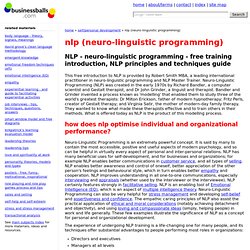
Neuro-Linguistic Programming (NLP) was created in the early 1970s by Richard Bandler, a computer scientist and Gestalt therapist, and Dr John Grinder, a linguist and therapist. Bandler and Grinder invented a process known as 'modelling' that enabled them to study three of the world's greatest therapists: Dr Milton Erickson, father of modern hypnotherapy; Fritz Perls, creator of Gestalt therapy; and Virginia Satir, the mother of modern-day family therapy. They wanted to know what made these therapists effective and to train others in their methods. How does nlp optimise individual and organizational performance? Nlp operational principles 1. 2. 3. 4. Nlp presuppositions. Top 10 Psychology Blogs For Curious Minds : Careers : Business.
Sandeep Gautam is the author of The Mouse Trap blog , a blog focusing on cognitive psychology and neuroscience, where latest psychological research articles and findings are taken as a springboard to theorize and synthesize across disciplines, and to come up with new conceptual and theoretical frameworks.
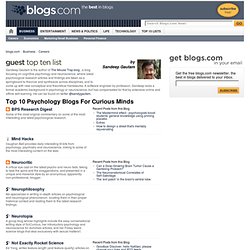
A software engineer by profession, Sandeep lacks a formal academic background in psychology or neuroscience, but has compensated for that by extensive online and offline self-learning. He can be found on twitter @sandygautam. BPS Research Digest Some of the most original commentary on some of the most interesting and latest psychological research. Mind Hacks Vaughan Bell provides daily interesting tit-bits from psychology, psychiatry and neuroscience, linking to some of the most interesting content on the web. Neurocritic Neurophilosophy Neurotopia Not Exactly Rocket Science PsyBlog Psychology Today –The Essential Read The Frontal Cortex We’re Only Human. Four Branch Model. My early (around 2000) comments on their model: I have a few concerns about their definition and some suggestions I would Jack Mayer and his colleagues to consider.
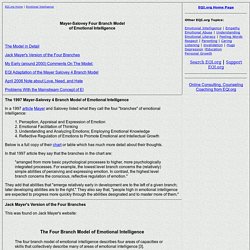
First, I would like to see them focus more on the idea that intelligence is potential. An infant can be intelligent, for example, without being able to read, write or take intelligence tests. In other words, he may have no demonstrable abilities as yet, but he may have extremely high potential ability. Collective unconscious. Collective unconscious is a term of analytical psychology, coined by Carl Jung.
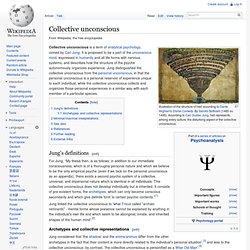
It is proposed to be a part of the unconscious mind, expressed in humanity and all life forms with nervous systems, and describes how the structure of the psyche autonomously organizes experience. Jung distinguished the collective unconscious from the personal unconscious, in that the personal unconscious is a personal reservoir of experience unique to each individual, while the collective unconscious collects and organizes those personal experiences in a similar way with each member of a particular species. Jung's definitions[edit] For Jung, “My thesis then, is as follows: in addition to our immediate consciousness, which is of a thoroughly personal nature and which we believe to be the only empirical psyche (even if we tack on the personal unconscious as an appendix), there exists a second psychic system of a collective, universal, and impersonal nature which is identical in all individuals.
See also[edit] Complex (psychology) For alternate usage, see complexity.
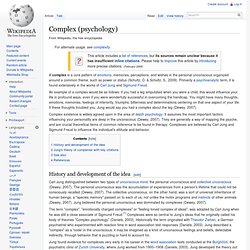
A complex is a core pattern of emotions, memories, perceptions, and wishes in the personal unconscious organized around a common theme, such as power or status (Schultz, D. & Schultz, S., 2009). Primarily a psychoanalytic term, it is found extensively in the works of Carl Jung and Sigmund Freud. An example of a complex would be as follows: if you had a leg amputated when you were a child, this would influence your life in profound ways, even if you were wonderfully successful in overcoming the handicap. You might have many thoughts, emotions, memories, feelings of inferiority, triumphs, bitterness and determinations centering on that one aspect of your life.